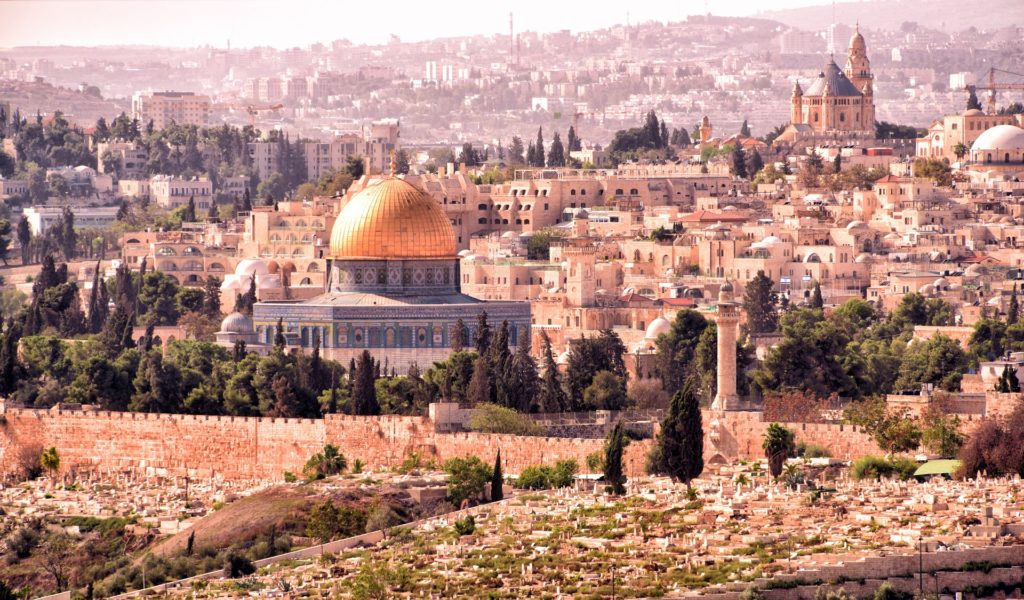
This post first appeared in Jordan Brief – January 2018 which was posted on the IMES blog on January 5, 2018.
On Sunday 17 December, King Abdullah of Jordan met with top leaders of Christian churches from Jerusalem and Jordan, during a Christmas celebration that took place at the Jordan River’s baptismal site. The status of Jerusalem, following President Trump’s formal “recognition” of the city as Israel’s capital, was the focus of the gathering. The importance of rejecting any changes to the city’s status quo, pending a comprehensive peace deal between Israelis and Palestinians, was reaffirmed in the remarks of both royal and clerics.
Among all Arab reactions witnessed over the past weeks, from peaceful street demonstrations to more assertive expressions that sometimes degenerated into violence, from diplomatic efforts to extraordinary summits and conference declarations, Jordan’s reaction and position bears special significance. The Hashemite royal family has held a semi-official custodial role over the city of Jerusalem since 1924, repeatedly sponsoring the renovation and maintenance of al-Aqsa mosque and other holy sites over the past few decades. The custodianship was put into writing for the first time in 2013, in a signed agreement between President Mahmoud Abbas and King Abdullah II. The Jordanian meeting was a collection of the expected poised statements by the king and several church leaders.
A couple of points made by the speakers regarding the status of Jerusalem and our relationship towards it are worth noting and reflecting upon:
- King Abdullah affirmed the “eternal right” of Muslims and Christians to Jerusalem. Although the statement is rhetorically impressive, it makes little sense in reality to refer to a city as both the existence and the ownership of a city are always ephemeral. If humans remembered that the earth belongs to God and that they are but custodians of what rightly belongs to God, there would no doubt be far fewer conflicts in the world. This, of course, does not preclude the importance of doing justice, and caring and advocating for the rights of people who are oppressed and dispossessed.
- Secondly, the faith leaders affirmed their rejection of the US decision, and they described it as “an illegal step that undermines peace and violates the teachings of Christianity.” The statement is true. But does it contain an underlying assumption that President Trump and America speak for (western) Christianity, and that therefore by affirming Jerusalem as Israel’s capital they were violating the “teachings of Christianity”? The need to affirm the non-Christian validity of the affirmation seems to imply this.
A few thoughts in closing. Christians, both middle-eastern and western, would do well to remember that Christ never ascribed sanctified value to land, building, earthly kingdom, or anything which, in his view, constituted a form of idolatry. In the face of issues and causes that captivate our hearts to the detriment of love of God and love of neighbor, Jesus had tough words: “No one can serve two masters. Either you will hate the one and love the other, or you will be devoted to the one and despise the other” (Luke 16:13). Although this statement is directly relevant in its biblical context to financial attachments, it can appropriately be applied to other things that captivate our hearts as well, such as political causes and rigid ideologies. To religiously-motivated struggle over Jerusalem, Jesus would no doubt have also affirmed: “Give to Caesar what is Caesar’s, and to God what is God’s” (see Matthew 22:21, Mark 12:17, and Luke 20:25). I don’t believe that God asks us to refrain from engaging in politics or from holding political opinion, but I do believe he would not have us do so at the expense of love and justice.
Finally, western Christians should be aware that when their governments act in certain ways, the middle-eastern “street” can often view the act as a “Christian” expression. The middle-eastern view of the world is generally more integrated than its western counterpart. Therefore, positions and behaviors that a western person might view as very secular or even agnostic, a Muslim may still associate with Christianity. And what’s more, Christians in the Middle East are then also ascribed the position and considered to be guilty by association. Hence the church leaders’ felt need to affirm before the King of Jordan that the Trump declaration “violated the teachings of Christianity.”
The dramatic “Jerusalem Declaration” was a good reminder that global Christians together form one body. When one member aches, other members ache as well. But we had better also remember that when one member of the body commits harm, it is the whole body that will suffer punishment.
